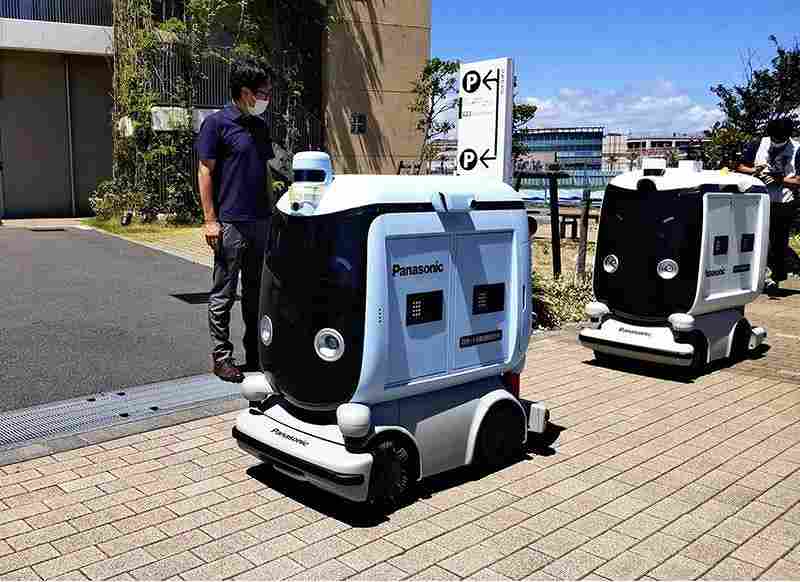
Box-shaped automatic delivery robots trundle along a sidewalk in Fujisawa SST, a smart city in Fujisawa, Kanagawa Prefecture.
November 18, 2021
Prime Minister Fumio Kishida’s “Vision for a Digital Garden City Nation,” aimed at revitalizing rural areas, is drawing fresh attention to Japan’s various “smart city” projects.
Smart cities are concept in which advanced technologies make everyday life easier and more efficient. A community with a drone delivery system, for example, offers a way to deal with the longstanding issue of elderly people who lack transportation in depopulated rural areas, as well as the newer issue of demand for a “contactless lifestyle” amid the COVID-19 pandemic.
Shopping by TV remote
“I will turn right … I will move forward.” Box-shaped autonomous delivery robots, about 1 meter tall, give vocal notice of their actions as they navigate a pedestrian crossing. This is an everyday scene in Fujisawa SST (Sustainable Smart Town), a smart city equipped with highly advanced technologies, which Panasonic Corp. opened in 2014 on its 19-hectare former plant site in Fujisawa, Kanagawa Prefecture.
The robots deliver food and medicine in a proof-of-concept experiment that Panasonic launched last year in response to the government’s efforts to quickly realize contactless interactions in communities, as part of measures to deal with the COVID-19 pandemic. The robots have special permission to move about on public roads.
A 37-year-old male company employee living in the town said: “Being provided with the most advanced technology services makes our life here quite convenient. I’d like to live here for a long time.”
In the city of Ina, Nagano Prefecture, where some communities are increasingly depopulated, daily necessities have been delivered by drone since last year. Orders can be placed via cable TV by using a familiar TV remote, helping the system take firm hold in the community.
It’s a real-world demonstration of a smart city concept by which rural mountain communities can keep elderly residents with limited access to shopping facilities from being left behind. “It is important to have the technology get close to residents,” said Akira Yasue, a section chief at the Ina municipal government’s planning and policy division.
Land prices up 50%
Smart cities aim to optimize community services and electricity consumption through information technology. The basic idea is to use telecommunications to connect the material aspects of individual life — such as houses, companies and automobiles — with shared infrastructure, such as electricity, gas and public transit, collecting and analyzing data on movement and consumption. According to the Cabinet Office, there are 20 to 30 smart cities in the country.
As society becomes ever more digital, smart cities have come to be viewed as potentially “wise cities” that can find solutions to diverse social problems, such as a population decline, an aging society with a low birthrate, and natural disasters, by providing people with government and private-sector services efficiently. With the task of coping with the COVID-19 pandemic added to the list, smart cities have been drawing more attention — and greater hopes — than ever before.
A range of industries have been involved in smart cities in Japan. The potential for huge profits makes town planning” appear to be an attractive business opportunity.
Big companies’ smart city projects include transforming former plant sites or other idle land into planned communities with state-of-the-art technology baked in.
A leading example is “Woven City,” which Toyota Motor Corp. has been developing in Susono, Shizuoka Prefecture, with autonomous driving at the core of its concept.
“Kashiwa-No-Ha Smart City,” in Kashiwa, Chiba Prefecture, where the use of electricity from renewable sources is being advanced, was once a rural district. Its smart city image attracted start-ups and facilities linked to academic institutions to move in one after another, sending the price of land 50% higher over the past 15 years.
Protecting privacy
The enhanced convenience of life in a smart city is based on the premise that residents’ private information will be collected and used. This raises the challenging issue of how to balance the benefits with the protection of privacy.
In Toronto, Canada, residents’ concerns about the handling of information prompted a sister company of U.S. internet giant Google to withdraw from a smart city project it had planned to take part in there.
Developing a smart city requires ongoing investment over a long period, but if the business performance of participating companies deteriorates, there is a risk that the flow of funds may subside.
A company official in charge of a smart city confided, “Our head office will pressure us that we should pull out of the project if we cannot expect to make profits immediately.”
Akira Naito, senior manager at PwC Consulting LLC., stressed, “Before embarking on the development of a smart city, [related parties] need to discuss sufficiently the future vision they aim to realize and the merits of doing so.”
Top Articles in Business
-

Prudential Life Insurance Plans to Fully Compensate for Damages Caused by Fraudulent Actions Without Waiting for Third-Party Committee Review
-

Narita Airport, Startup in Japan Demonstrate Machine to Compress Clothes for Tourists to Prevent People from Abandoning Suitcases
-

JR Tokai, Shizuoka Pref. Agree on Water Resources for Maglev Train Construction
-

Toyota Motor Group Firm to Sell Clean Energy Greenhouses for Strawberries
-

SoftBank Launches AI Service for Call Centers That Converts Harsh Customer Voices into Softer Voices
JN ACCESS RANKING
-

Japan PM Takaichi’s Cabinet Resigns en Masse
-

Japan Institute to Use Domestic Commercial Optical Lattice Clock to Set Japan Standard Time
-

Israeli Ambassador to Japan Speaks about Japan’s Role in the Reconstruction of Gaza
-

Man Infected with Measles Reportedly Dined at Restaurant in Tokyo Station
-

Man Infected with Measles May Have Come in Contact with Many People in Tokyo, Went to Store, Restaurant Around When Symptoms Emerged






















